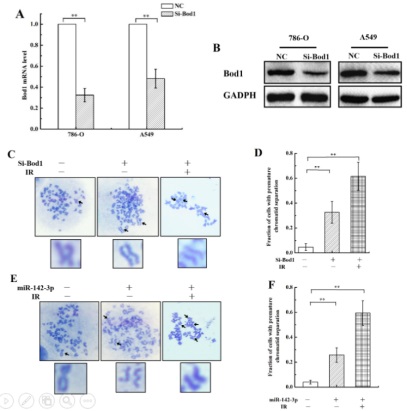The researchers in the Key Laboratory of Space Radiobiology at Institute of Modern Physics (IMP), Chinese Academy of Sciences have investigated the radiation induces premature chromatid separation by miR-142-3pBod1 pathway in carcinoma cells.
Radiation-induced genomic instability (RIGI), a common long-term complication resulting from exposure to ionizing radiation, plays a crucial role in radiation-induced carcinogenesis. It is characterized by an increase in genomic alterations in the progeny of irradiated cells that are associated with karyotypic abnormalities, gene mutation and amplification, cellular transformation, clonal heterogeneity, and delayed reproductive cell death. Premature chromatid separation is included in this process. MicroRNAs (miRNAs) are an important class of conserved, small noncoding RNAs that target the 3’-UTRs of target mRNAs to repress mRNA expression. MiRNAs play crucial regulatory roles in a wide range of biological processes, including proliferation, differentiation, apoptosis, and cell mobility, as well as carcinogenesis.
The researchers found that radiation induced premature chromatid separation and altered miR-142-3p and Biorientation of chromosomes in cell division 1(Bod1) expression in 786-O and A549 cells. Overexpression of miR-142-3p increased premature chromatid separation and G2/M cell cycle arrest in 786-O cells by suppressing Bod1 expression. The researchers also found that either overexpression of miR-142-3p or knockdown of Bod1 sensitized 786-O and A549 cells to X-ray radiation. Overexpression of Bod1 inhibited radiation- and miR-142-3p-induced premature chromatid separation and increased resistance to radiation in 786-O and A549 cells. Taken together, these results suggest that radiation alters miR-142-3p and Bod1 expression in carcinoma cells, and thus contributes to early stages of radiation-induced genomic instability. Combining ionizing radiation with epigenetic regulation may help improve cancer therapies.
This work was supported by National Natural Science Foundation of China [U1432121, 31170803] and the National Key Scientific Instrument and Equipment Development Project of China [2012YQ03014210].
The work has been published in Oncotarget, 2016 (DOI: 10.18632/oncotarget.11080).
The article can be linked as follows:
http://www.impactjournals.com/oncotarget/index.php?journal=oncotarget&page=article&op=view&path[]=11080&author-preview=8js

Figure 1: siRNA-induced Bod1 knockdown or miR-142-3p overexpression increases premature chromatid separation in 786-O cells.

